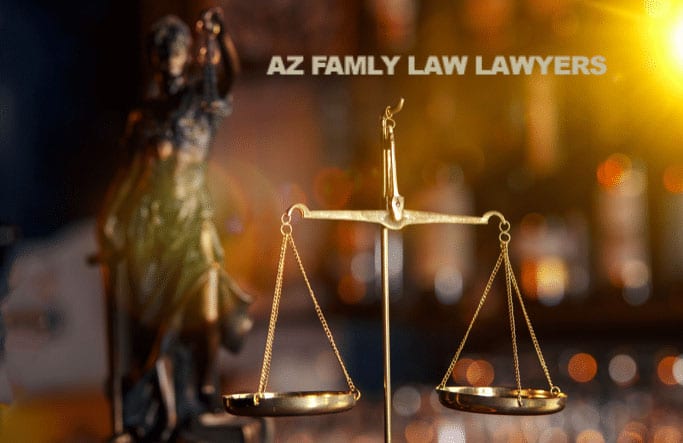Arizona Family Law Terms
Be Ready For Anything
If you have an active or impending child support case in Arizona, it’s important that you understand the general language that will be used in the proceedings. Before consulting with an Arizona family law attorney about your situation, look over these terms to help your understanding of your future child support case.
Our Arizona Family Law team has picked out some of the most popular and used words surrounding Arizona Family Law. We have defined these words and made an alphabetical reference guide so that you may better understand the AZ Family Law terminology.

-
Affidavit
A sworn, voluntary statement that can be witnessed or notarized. Affidavits can be used to save time and establish facts outside of court.
-
Age of majority
The age at which the obligation to pay child support terminates. In Arizona, the age of majority is 18 unless the child has not yet finished high school. In that case, support can continue until the child turns 19.
-
Change of Circumstances
The grounds for a modification of child support. A change of circumstances must be both substantial and continuing for a modification to be granted. Substantial generally means a change in income of 10% or more, and continuing means it will persist for a long time, and is not a reduction in income the parent purposely sought to reduce child support.
-
Clearinghouse
The central system used to send, receive, and monitor child support payments.
-
Cost of Living Adjustment
A child support adjustment based on standard inflation. Many support orders will contain an automatic cost of living adjustment provision based on a specified reporting agency.
-
Default
When one parent fails to respond to child support court proceedings. The court can enter a judgment granting everything the petitioner parent requests if the respondent parent defaults.
-
Child Support
A parent’s financial contributions to the care and raising of their child, usually who primarily lives with the other parent. Child support is usually made in monthly payments, per a court order. There are many factors that go into calculating child support, like the parents’ income, how much parenting time each parent has, the age and any special needs of the child, child care costs, whether the parent maintains insurance coverage and other expenses, and if the parent has other dependents.
-
Consent Agreement
A voluntary contract both parents can sign outside of court. If the judge approves of the parents’ consent agreement on child support, the issue won’t need to go to trial.


-
Custody Order
A custody order will generally contain the court’s rulings on who should have legal decision-making and parenting time with the child. Legal decision-making won’t affect the child support obligation, but parenting time will.
-
Dependent
Someone that another person has a legal obligation to, usually a minor child.
-
Division of Child Support Services (DCSS)
A division of the Department of Economic Security focused on the operation and administration of child support payments.
-
Enforcement
The steps taken to collect child support from a parent who is in arrearage. Wage garnishments, asset seizures, liens, interception of funds like lottery winnings and tax returns, and license suspensions are common methods of enforcement when a parent is behind on child support.
-
Garnishment
A method used to collect child support. Wages can be garnished for child support at a much higher rate than other debts. While standard debts usually max out at 15-25%, your wages can be garnished up to 50% for child support. That amount increases to 60% if you have no other dependents, and an additional 5% is added if you are more than 12 weeks behind on your payments.
-
Home State
The state in which a child has been residing for at least six months. Child support cases must be brought in the child’s home state.
-
Joint Custody
When both parents have legal decision-making and parenting time with the child. When one parent has all legal decision-making authority and parenting time with the child, this is referred to as “sole custody.”
-
Legal Decision Making
The authority on decisions in the child’s life like medical treatment, education, legal claims, religion, and personal care.
-
Lien
A lien can be placed on your property if you fall too far behind on your payments, and it won’t be removed until you become current on child support.
-
Parenting Plan
The legal schedule of the child’s time with each parent. The amount of time the child spends with each parent is a factor used to calculate child support payments.
-
Statute of Limitations
The legal time limit you have to file a case. In Arizona, you can request child support for up to 3 retroactive years. For example, if your child is 14 and you have never had an official child support order, you can request the other parent begin paying child support now as well as payments for when the child was 11-14.
-
Income
For child support purposes, income includes wages, salary, commissions, tips, worker’s compensation, disability and unemployment benefits, bonuses, pension, veteran’s benefits, rental income, and more.
-
Income Withholding Order
A court order for an employer to garnish the parent’s wages and send them to the appropriate agency. Income withholding orders can be sent to different states, so moving out of Arizona to avoid paying child support isn’t a possibility.
-
Interest
In Arizona, unpaid child support has an interest rate of 10% simple interest per year.
-
Medical Support
Financial support in relation to the child’s medical needs, including health insurance, cash medical support, and medical bill payment.
-
Notice
Information or written notice to advise someone of a legal proceeding in which they are involved. Many documents will need to be served on the other party by a process server in order for notice to be proper.
-
Offset
When a parent is in arrearages on child support, money deducted from tax refunds and administrative payments to satisfy the past-due support.
-
Paternity
In some cases, paternity must be established before holding a father financially responsible for a child. There will be a presumption that the man is the father if the parents were married when or within 10 months before the child’s birth. The father can also sign the birth certificate or an affidavit stating that he is the father. Otherwise, the alleged father may be ordered by the court to take a DNA test. If the test comes back a 95% or higher match, paternity will be established and that father will have an obligation to pay child support, and possibly parental rights.
-
Summons
Legal notice that the parents must appear in court for a hearing or other proceeding.
Recent Posts

Contact The Family Law Attorney


